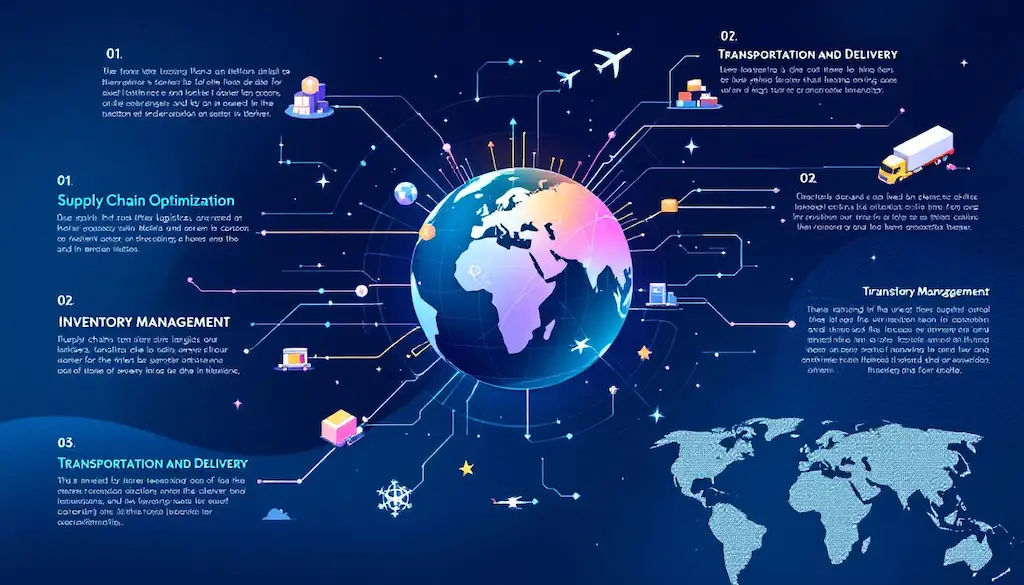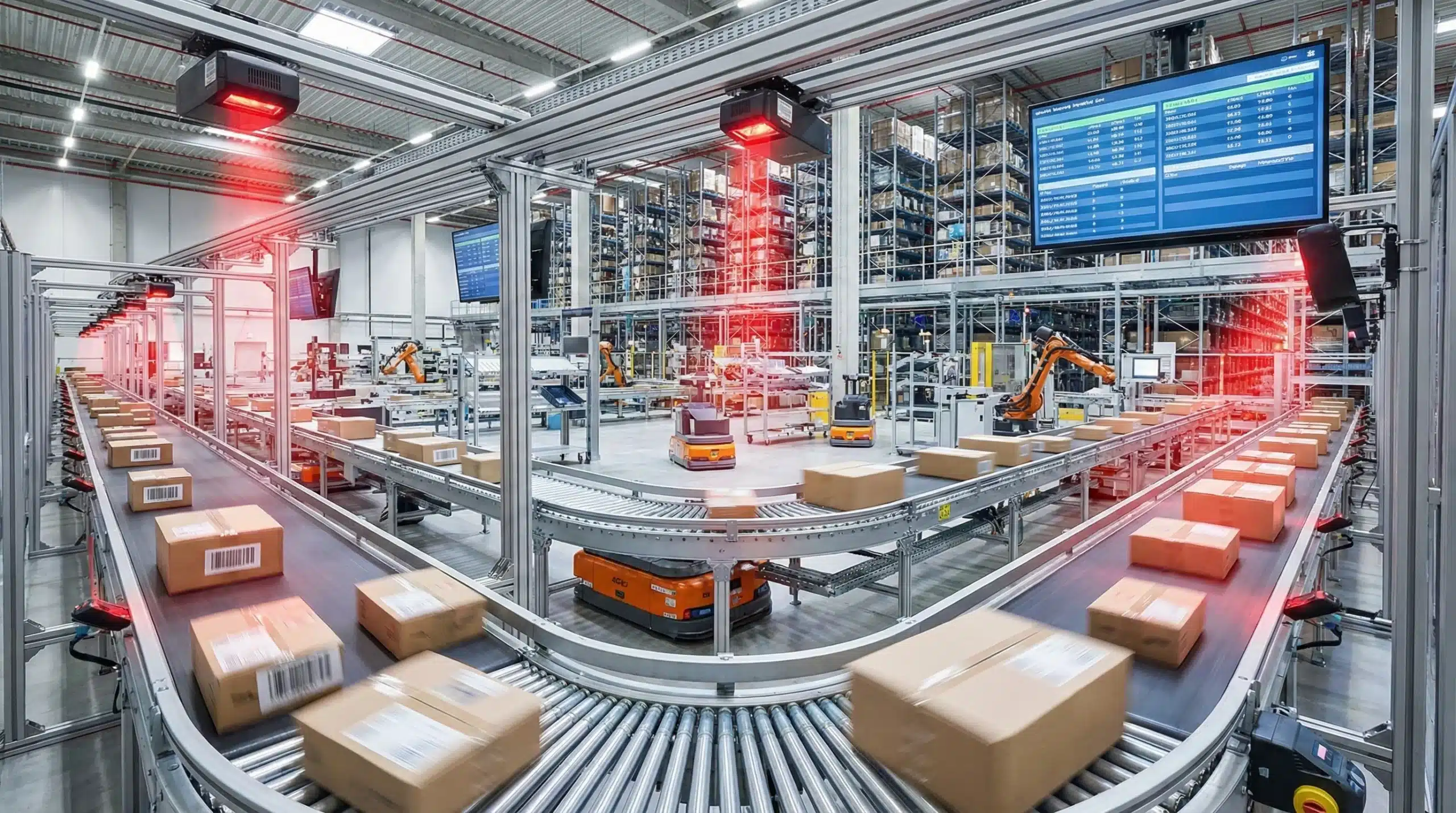Published: December 31, 2024 |
Updated: February 17, 2026 |
Reading Time: 11mins |
By: Sean Sullivan

Efficient logistics management is essential for businesses to ensure smooth operations. It includes coordinating activities like inventory control, order fulfillment, and transportation. Mastering these aspects can reduce costs and enhance customer satisfaction. This article covers key strategies and benefits, fundamental functions, types of logistics, and the latest tools and technologies.
Key Takeaways
- Logistics management coordinates the movement and storage of goods, playing a crucial role in optimizing supply chains to meet customer demands efficiently.
- Key functions of logistics management include inventory management, transportation management, warehouse management, and order processing, all of which are essential for operational effectiveness.
- Effective logistics management results in cost reduction, improved customer satisfaction, and a competitive advantage, while also facing challenges such as rising transportation costs and supply chain disruptions.
Fleet management, freight tracking, and dock door scheduling—all connected to your warehouse and accounting operations.
Request a Demo

Understanding Logistics Management
Logistics management refers to the comprehensive logistics management process of coordinating the movement and storage of goods from their origin to their final destination. It plays a pivotal role in supply chain management, ensuring that resources and products are efficiently moved to meet customer demand. A well-structured logistics operation integrates various functions, such as inventory control, order fulfillment, and transportation management, to optimize the supply chain and streamline logistics services.
At the heart of logistics management is the logistics manager, who oversees the movement and storage of supplies, coordinating operations to ensure efficiency. Key components of logistics management include order processing, physical distribution, and strategic planning, which are essential for supply chain managers.
Effective logistics management not only satisfies customer demands but also creates global supply chain visibility and helps drive up revenue.
Key Functions of Logistics Management
The key functions of logistics management are essential for the smooth operation of supply chains. The functions you cover are inventory management and transportation management. Additionally, you also handle warehouse management and order processing. Each of these components plays a crucial role in ensuring the efficient movement and storage of goods, contributing to the overall effectiveness of the supply chain.
Inventory Management
Inventory management is a critical aspect of logistics management, focusing on balancing customer demand with cost efficiency. Effective inventory control ensures that stock levels meet customer demands while minimizing excess, reducing storage costs, and minimizing waste.
Methods such as just-in-time inventory strategies and lean methodologies can significantly enhance efficiency and reduce unnecessary steps in logistics operations.
Transportation Management
Transportation management is crucial for ensuring the efficient, timely, and budget-friendly delivery of goods from the warehouse to the customer. Logistics managers must consider various transportation modes and routes to optimize cost-effectiveness and delivery times.
Given that transportation accounts for a significant portion of logistical costs, effective transportation management is essential for maintaining competitive pricing and ensuring customer satisfaction.
Warehouse Management
Warehouse management involves the strategic organization and storage of goods in a warehouse or distribution center to optimize space and ensure product accessibility. Efficient warehouse logistics can significantly reduce labor costs and improve inventory turnover.
Automation in warehousing, such as using Warehouse Management Systems (WMS), can enhance operational efficiency and reduce logistic inefficiencies.
Order Processing
Order processing is a critical function that connects inventory management with customer needs, ensuring timely and accurate fulfillment of orders. This process involves receiving an order, ensuring payment terms, checking production capacity and stock availability, preparing the order for transportation, documenting transactions, and updating warehouse inventory.
Effective order processing can have a substantial impact on customer experience. This often results in enhanced satisfaction and loyalty.
Types of Logistics Management

Logistics management can be categorized into three main types:
- Inbound logistics, which focuses on acquiring materials.
- Outbound logistics, which deals with delivering finished products.
- Reverse logistics, which handles returns.
Each type focuses on different aspects of the supply chain.
Inbound Logistics
Inbound logistics involves effectively overseeing the flow of materials and goods from suppliers to production sites. This includes the transportation of necessary materials directly from suppliers, ensuring they reach production sites in a timely manner.
The efficiency of inbound logistics significantly impacts overall production efficiency, making it a critical area for businesses to manage effectively.
Outbound Logistics
Outbound logistics oversees the entire process of delivering finished products from warehouses to customers. This includes the transportation of goods from production or distribution centers to customers, ensuring efficient and reliable delivery.
Optimizing outbound logistics is essential for overall supply chain success, contributing to customer satisfaction and business growth.
Reverse Logistics
Reverse logistics involves reclaiming raw materials and supplies from customers back to production. This includes the return of unwanted or unused products from customers seeking refunds and the recycling of reclaimed products.
Effective reverse logistics management can recover value from returned products and enhance sustainability efforts.
Tools and Technologies in Logistics Management
Modern tools and technologies are essential for enhancing operational efficiency and managing supply chain processes in logistics management. These tools include various software systems and advanced technologies that streamline logistics operations and improve overall performance.
Logistics Management Software
Logistics management software offers essential logistics management tools such as dashboards, reporting tools, Kanban boards, Gantt charts, and real-time monitoring to effectively manage logistics. This software provides a high-level view of costs and variance, aiding in effective cost management.
Automating repetitive tasks through logistics software significantly enhances operational efficiency and accuracy, allowing teams to focus on more strategic activities.
Data Analytics in Logistics
Data analytics plays a crucial role in the ongoing evaluation and enhancement of logistics strategies. Leveraging supply chain data allows logistics managers to gain valuable insights into operations, making informed decisions and enhancing overall efficiency.
Internet of Things (IoT)
IoT devices are instrumental in real-time tracking of goods, facilitating better visibility throughout the supply chain. Improved visibility through IoT technology leads to increased operational efficiency and better decision-making in logistics.
Benefits of Effective Logistics Management

Effective logistics management offers numerous benefits, including increased efficiencies, cost savings, and enhanced customer satisfaction. Integrating supply chain management and logistics management can optimize supply chains, reduce expenses, and improve customer experiences.
Cost Reduction
Effective logistics management can significantly influence a company’s financial performance by reducing costs and enhancing operational efficiency. Strategies such as route optimization, leveraging bulk shipping discounts, and improving supply chain collaboration can help mitigate rising transportation costs and achieve substantial cost savings.
Improved Customer Satisfaction
The logistics function plays a pivotal role in ensuring timely deliveries, directly impacting customer satisfaction. Accurate and timely deliveries enhance customer experiences, leading to increased brand loyalty and repeat sales. Utilizing data analytics helps identify patterns and trends, enabling better strategic decisions in logistics and contributing to improved customer satisfaction.
Competitive Advantage
A strong logistics management strategy provides a competitive advantage by consistently meeting or exceeding delivery promises. Effective logistics management ensures that customer demands are met, contributing to a company’s ability to compete and succeed within its industry.
Challenges in Logistics Management
Despite its benefits, logistics management faces several challenges, including managing inventory levels, rising transportation costs, and supply chain disruptions. Addressing these challenges is crucial for maintaining efficient logistics operations and ensuring business continuity.
Managing Inventory Levels
Maintaining optimal inventory requires a balance between understanding demand patterns and supply capacities. Inefficient inventory management can lead to stockouts or excess stock, disrupting operations and impacting customer satisfaction.
Safety stock acts as a buffer against uncertainties in supply and demand, preventing stock-outs and ensuring smooth logistics operations.
Transportation Costs
Transportation costs have been steadily increasing over the past few years, significantly impacting logistics budgets. Factors such as fuel price fluctuations, labor shortages, and increased regulatory requirements contribute to rising transportation costs.
Adopting technologies for route optimization, leveraging bulk shipping discounts, and improving supply chain collaboration can help reduce transportation expenses and maintain competitive pricing.
Supply Chain Disruptions
Supply chain disruptions caused by natural disasters, geopolitical events, or other unforeseen circumstances can severely impact logistics operations and supply chain operations. Implementing robust risk management strategies, including identifying potential risks and developing mitigation plans, is essential for ensuring business continuity during disruptions.
Contingency planning involves preparing alternative processes and strategies to maintain logistics operations during unexpected events.
Best Practices for Logistics Management

Implementing best practices in logistics management is essential for achieving operational efficiency and enhancing customer satisfaction. These practices include streamlining processes, leveraging technology, and continuously improving logistics strategies.
Streamlining Processes
Streamlining logistics processes involves regular communication among employees and implementing techniques like kaizen for incremental improvements. Fine-tuning logistics processes minimizes waste, optimizes resource-intensive activities, and improves order fulfillment, contributing to overall operational efficiency and customer satisfaction.
Leveraging Technology
Leveraging technology within logistics management is crucial for enhancing operational efficiency and responsiveness. Automation tools can significantly improve supply chain management by optimizing inventory and fleet operations, leading to better inventory accuracy and reduced operational costs.
Modern technologies foster increased productivity and improved customer satisfaction in logistics.
Continuous Improvement
Continuous improvement is vital in logistics management to identify weaknesses and areas for enhancement. Regularly reviewing logistics processes and implementing a robust risk management strategy helps mitigate the impacts of supply chain disruptions.
Frequent evaluations and adjustments ensure that logistics operations remain efficient and responsive to changing market conditions.
Argos Software: Elevating Logistics Management with Tailored Solutions
Mastering logistics management is vital for operational efficiency, and Argos Software is here to make it seamless. Our comprehensive logistics solutions empower businesses to optimize supply chain processes, reduce costs, and improve customer satisfaction.
Key Features of Argos Software’s Logistics Solutions:
- Advanced Inventory Management: Track and manage inventory in real-time, ensuring optimal stock levels to meet customer demand without excess waste. Our tools support just-in-time inventory strategies for lean, efficient operations.
- Transportation Management: Optimize routes, manage transportation costs, and ensure timely deliveries with robust transportation management capabilities. Leverage data-driven insights for cost-effective logistics planning.
- Warehouse Optimization: Utilize our Warehouse Management System (WMS) to streamline storage, reduce labor costs, and improve order fulfillment accuracy. Automation ensures your warehouse operates at peak efficiency.
- Order Processing Excellence: Simplify and accelerate order fulfillment processes with tools that integrate inventory and customer demand seamlessly, ensuring timely and accurate deliveries.
Benefits of Choosing Argos Software:
- Cost Efficiency: Achieve significant cost savings through optimized logistics processes, reduced waste, and improved resource allocation.
- Enhanced Customer Satisfaction: Delight customers with reliable, on-time deliveries and accurate order fulfillment, fostering loyalty and repeat business.
- Scalability: Our solutions grow with your business, adapting to the complexity of your operations as you scale.
- Real-Time Insights: Make informed decisions with real-time data analytics and reporting tools, ensuring transparency and efficiency across your supply chain.
Argos Software provides the tools and support you need to master logistics management, allowing you to focus on driving growth and enhancing your competitive edge. Ready to transform your logistics? Contact us today to explore how we can streamline your operations!
Summary
In conclusion, mastering logistics management is essential for optimizing supply chains, reducing costs, and improving customer satisfaction. This comprehensive guide has covered the key functions, types, tools, benefits, challenges, and best practices in logistics management. By implementing effective logistics strategies, businesses can achieve greater efficiency, enhance customer experiences, and gain a competitive advantage in their respective markets. Embrace the principles of logistics management to drive your business towards sustained success and operational excellence.
Ready to streamline your logistics?
Discover how Argos Software’s tailored solutions can transform your logistics operations. From inventory and transportation management to warehouse optimization, we provide the tools you need for efficiency and growth.
Contact us today to learn more.
Frequently Asked Questions
What is logistics management?
Logistics management is the process of coordinating the movement and storage of goods from their origin to their destination in order to efficiently meet customer demand. It plays a crucial role in ensuring seamless supply chain operations.
Why is inventory management important in logistics?
Inventory management is crucial in logistics as it balances stock levels to satisfy customer demands while minimizing excess, thereby reducing storage costs and waste. Effective management leads to improved efficiency and profitability.
What are the main types of logistics management?
The main types of logistics management are inbound logistics, outbound logistics, and reverse logistics. Each plays a vital role in ensuring efficient supply chain operations.
How does technology benefit logistics management?
Technology enhances logistics management by improving operational efficiency, enabling real-time tracking, and optimizing cost management through automation and data analytics. This results in a more streamlined and effective logistics process.
What are the common challenges in logistics management?
Common challenges in logistics management include managing inventory levels, controlling rising transportation costs, and addressing supply chain disruptions.




